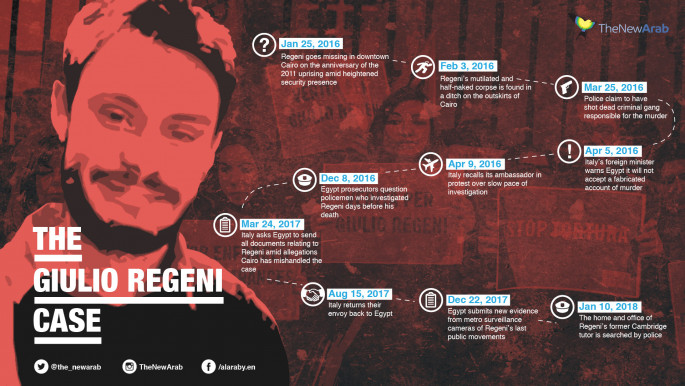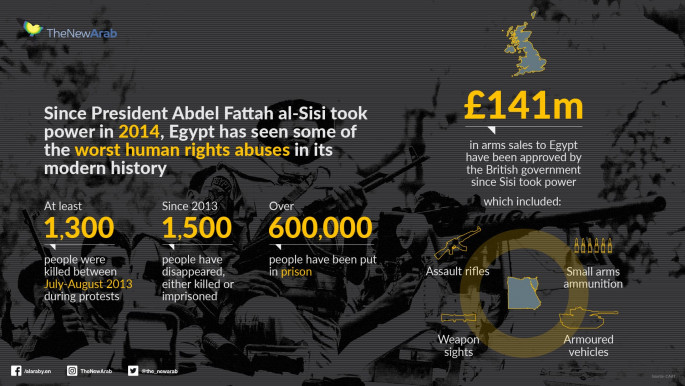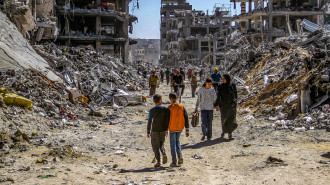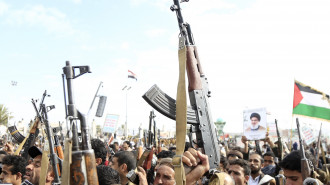Mega arms deal with Egyptian regime exposes Italy's 'hypocrisy' on rights abuses, destabilisation of Libya
Italy's insistence on going ahead with a controversial and potentially illegal mega arms deal with Egypt's regime is exposing what critics say is Rome's amoral, racist, and even short-sighted realpolitik.
On June 12, despite parliamentary and popular opposition, the Italian government green-lighted the sale of two warships to Egypt for a total of $1.2 billion, one of Italy's largest arms sales since the second world war.
Despite Egypt representing a destabilising force in neighbouring Libya and a serial abuser of human rights accused of an ongoing cover up of the 2016 murder of an Italian citizen, the Italian foreign ministry is set to formalise the deal, the last step in the process, in the coming weeks.
"This government has betrayed us," Paola and Claudio, parents of the slain Italian student Giulio Regeni, told local press this week following the announcement which triggered widespread outrage by those demanding accountability for his death.
In a gruesome and still unsolved case, the body of 28-year-old Cambridge University researcher Giulio Regeni was found in Cairo in 2016 bearing extensive signs of torture.
In 2018, Italian prosecutor Giuseppe Pigatone said that Regeni was murdered over his research into Egyptian labour unions, which attracted the attention of Egyptian security officials. The case strained relations between Cairo and Rome, which accused Egypt of insufficient cooperation in the investigation.
 |
'Illegal deal'
The Italian government has defended the new arms deal, with prime minister Giuseppe Conte claiming last week that the best way to resolve the case was to keep channels open with Egypt – including by selling it weapons.
Italian sources close to the government speaking to The New Arab on condition of anonymity due to the sensitivity of the topic said the government has "total respect" for the family, but that its position is to "maintain a political relationship with Egypt during this delicate time."
The campaign and Amnesty Italy's hashtag #StopArmiEgitto (#StopEgyptianArms) has since gained broad-based traction online, with pressure on the government increasing to scrap the deal.
"I would like to underline that the way the Italian government has formulated this trade deal with Egypt is illegal under Italian law," Riccardo Noury, spokesperson for Amnesty International Italy, told The New Arab.
Under Italy's 185 law passed in 1990, and international law conventions signed by Rome, Italian exports of arms are illegal when provided to a country at war or one that is severely violating the human rights of its people.
Egypt fits into both categories. On Saturday, Egypt's strongman Abdel-Fattah al-Sisi threatened military intervention in Libya which could put the new Italian weapons into use in an illegal war against the internationally recognised government in Tripoli.
Sisi also presides over a military regime since a 2013 coup he orchestrated toppled the country's first democratically elected President Mohamed Morsi, unleashing an ongoing crackdown on political dissent that has seen thousands killed and tens of thousands imprisoned.
 |
"I would like to underline that the way the Italian government has formulated this trade deal with Egypt is illegal under Italian law," |  |
Italian law also requires the parliament to have a say on the matter, but the government has so far failed to debate it in parliament in a meaningful way.
Amnesty Italy has threatened legal action against the government if the deal were to be ratified by the Ministry of Foreign Affairs without a parliamentary debate.
An unresolved past
Egypt's best-known youth activist, Ahmed Douma is serving 15 years in jail for protesting against Sisi in 2013. He is the same age Giulio would have been if he were still alive today.
Douma survived a violent security 2013 crackdown on a protest, which resulted in 12 deaths. At his trial he along with 228 others were jailed for 25 years and fined almost a million dollars. Douma and other activists have reported being beaten by security guards before their appeal hearing, painting a pretty dire picture of a regime propped up by it's military prowess.
"There is still time for people to mobilise and demand that this deal be stopped. Like the parents of Regeni have said, this is to protect the lives of Giulios and Giulias in Egypt too," said Noury.
Read also: Remembering Sara Hegazy: Arab LGBT community mourns the loss of a 'beacon of hope'
Such extensive records of human rights violations have seldom earned a spot on the front pages of Italian newspapers, but the Regeni case may have started to change that.
"The government did not care about the countless Arab lives taken by the Egyptian regime, but as soon as Giulio's name came up, they pretended to care, but this deal is hypocritical because instead of sanctioning Egypt for its actions, they are rewarding it."
To Elisabetta Brighi, lecturer in International Relations at the University of Westminster, Italy's "inward-looking" political culture has yet to delve into its colonial past, which continues to affect its foreign policy towards the region.
Twitter Post
|
"The press has exotisised and orientalised brown and black lives which in turn has characterised the politics of the Middle East," she said.
"The Black Lives Matter debate is now somewhat resonating, but historically we have a collective amnesia of Italian colonialism. There is a lack of engagement with non-European lives as it's still a parochial country, and in some sense narrow minded when it comes to the international landscape."
According to Brighi, Italy's main portrayal of the Middle East and North Africa region is linked closely with the migrants who land on its shores.
"In Italy the migration question has never been considered that this incredible loss of live because we are talking about non-white lives.
"It's the same with Egypt. The race factor plays a role."
She says that the loss of a white life, like the one of Regeni's case, has managed to shed a light on human rights issues that previously have rarely been given importance.
Just business?
Italy's deal is not the first of its kind in Europe: France has sold billions of euros' worth of arms to Egypt while Conservative governments in the UK have in recent times approved £2bn in arms sales to autocratic regimes which included Saudi Arabia and Sisi's Egypt.
The Italian government sources argued that if Italy did not take up the deal with Egypt, other European powers would take its place, and Italy would lose economic and employment opportunities in a country devastated by lockdown measures.
But Brighi, from the University of Westminster, said the deal will not serve the Italian economy as a whole, but the interests of big business corporations such as Fincantieri, the shipbuilding group building the warships; and Eni, Italy's leading energy corporation that has consistently expanded its presence in Egypt despite Regeni's murder.
"The claims that this will create jobs is a weak argument as it's profitable for the military itself but not the economy as a whole. There has been a subservient attitude towards Eni and Fincantieri because they were state owned until recently, now they are private but there is still an inter-mingling with politicians. The interests of capitalist groups are coming first which is affecting the legitimacy of the government and public opinion is already turning on them."
Not only does this deal violate an EU moratorium on arms sales to the Sisi regime issued over human rights concerns, but it also sponsors an ally of Haftar's rogue forces in Libya. Haftar stands in direct confrontation with the internationally recognised Government of National Accord, which Italy has spent over five years supporting.
 |
The Italian arms deal with Egypt "exposes us to criticisms of double standards and incoherence in policy, which weakens public support for the government," said Dr. Silvia Colombo, Head of the Mediterranean and Middle East Programme at the Institute of International Affairs,
"It also exposes our fragility and inconsistency with our partners in the Mediterranean. We're not always taken seriously due to this lack of coherence. In the end it is opportunism without much pragmatism, and with an added lack of a long-term vision."
With regard to human rights abuses, the Italian government sources said that there needs to be a European collective response against violations by Sisi's regime, saying Italy could not be the only power taking it upon itself to hold Egypt accountable.
Frank Slijper, Arms Trade expert at PAX, a Dutch NGO focused on peace building, called out the "hypocrisy" of this European behaviour.
"European states are very good in portraying themselves as moral leaders and defenders of democracies, especially in the Arab world, but if you compare it to the everyday reality of the arms trade you've actually seen that after 2013 the US has been more reluctant to supply arms to Egypt, and so Russia and Italy are stepping in," said Slijper.
"When you export weapons to an autocratic state you endorse the leadership of that country. Selling weapons to a dictator is a slap in the face to anyone trying to improve the human rights situation in Egypt. Sisi investing so much in his naval equipment it's scary to see how it will turn out in the long run."
Gaia Caramazza is staff journalist at The New Arab. Follow her on Twitter @GaiaCaramazza.





 Follow the Middle East's top stories in English at The New Arab on Google News
Follow the Middle East's top stories in English at The New Arab on Google News


